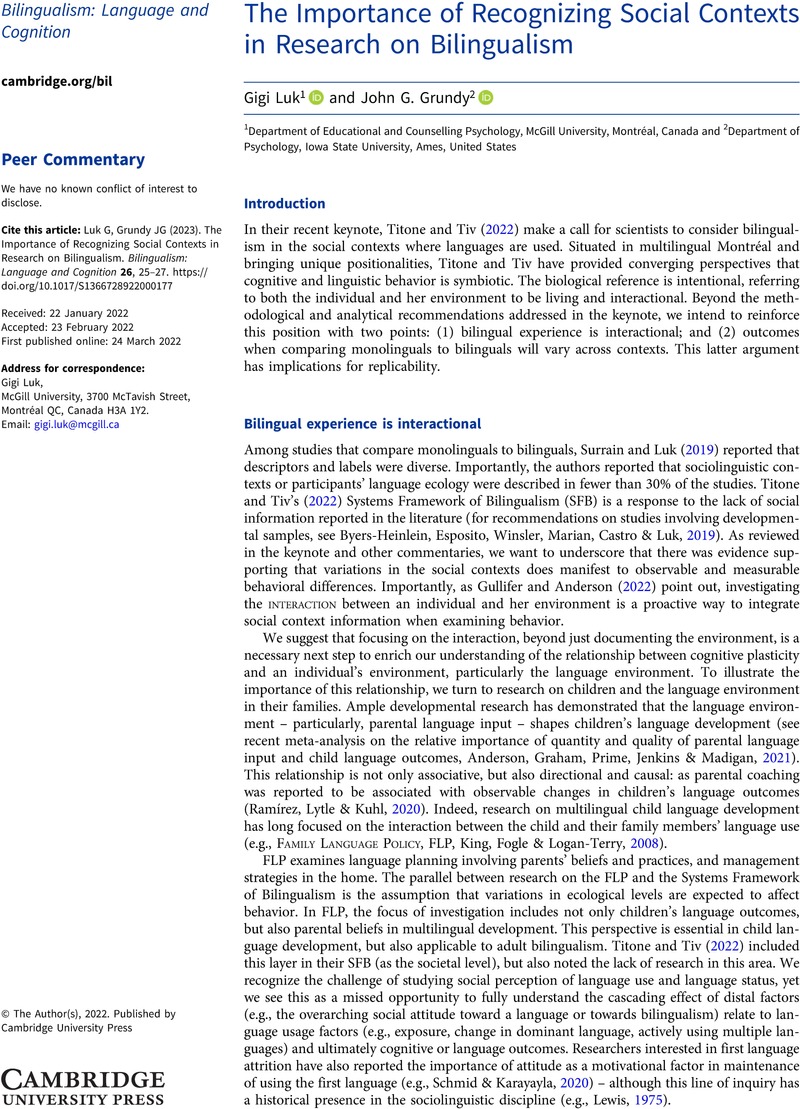Crossref Citations
This article has been cited by the following publications. This list is generated based on data provided by Crossref.
Anderson, John A.E.
and
Grundy, John G.
2023.
Understanding Language and Cognition through Bilingualism.
Vol. 64,
Issue. ,
p.
374.
TİRYAKİOL, Selim
2023.
Turkish Heritage Language Programs for Immigrant Children in the United States: The Current State and Opportunities.
RumeliDE Dil ve Edebiyat Araştırmaları Dergisi,
p.
457.
Feng, Justin
Cho, Sohyun
and
Luk, Gigi
2023.
Assessing Theory of Mind in bilinguals: A scoping review on tasks and study designs.
Bilingualism: Language and Cognition,
p.
1.
Venugopal, Aparna
Paplikar, Avanthi
Varghese, Feba Anna
Thanissery, Nithin
Ballal, Divya
Hoskeri, Rakshith Maneshwar
Shekar, Revathi
Bhaskarapillai, Binukumar
Arshad, Faheem
Purushothaman, Vandana Valiyaparambath
Anniappan, Aravind Banavaram
Rao, Girish Nagaraja
and
Alladi, Suvarna
2024.
Protective effect of bilingualism on aging, MCI, and dementia: A community‐based study.
Alzheimer's & Dementia,
Vol. 20,
Issue. 4,
p.
2620.
Masullo, Camilla
Casado, Alba
Leivada, Evelina
and
Comesaña Vila, Montserrat
2024.
The role of minority language bilingualism in spotting agreement attraction errors: Evidence from Italian varieties.
PLOS ONE,
Vol. 19,
Issue. 2,
p.
e0298648.







Target article
Rethinking multilingual experience through a Systems Framework of Bilingualism
Related commentaries (7)
Bilingual language cognition as a complex adaptive system
Challenges of Complexity, and Possible Solutions: a Commentary on Rethinking Multilingual Experience through a Systems Framework of Bilingualism by Titone and Tiv
Exploring nuance in both experience and adaptation: Commentary on Titone and Tiv (2022)
How to frame bilingualism in context: Putting people and places in mind
Sociocultural dimensions of early dual language learning
The Importance of Recognizing Social Contexts in Research on Bilingualism
The systems framework dispels causal illusions and organizes multi-causal models
Author response
Rethinking Multilingual Experience through a Systems Framework of Bilingualism: Response to Commentaries